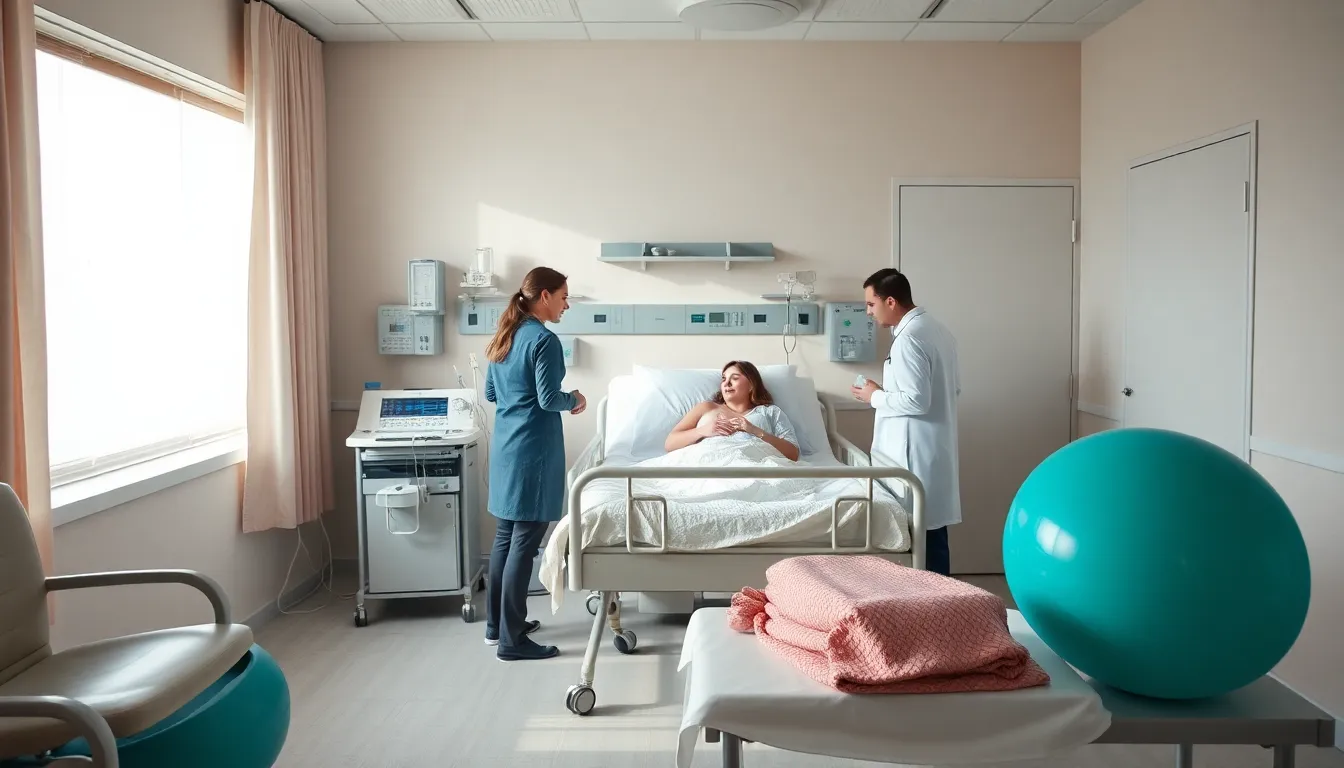When it comes to bringing a new life into the world, the big question looms: hospital or home birth? It’s like choosing between a rollercoaster ride and a cozy couch—both have their perks, but the thrill and comfort levels vary dramatically. Some parents swear by the sterile, high-tech environment of a hospital, while others crave the warm embrace of their own living room, complete with a playlist of their favorite tunes and perhaps a snack bar.
Navigating this decision can feel like a game of chess, but with a little humor and insight, it doesn’t have to be daunting. With so many factors to consider—safety, comfort, and personal preference—this article will help parents weigh the pros and cons. After all, whether you’re in a hospital gown or your pajamas, the goal is the same: a happy, healthy arrival of your little one.
Table of Contents
ToggleOverview of Birth Options
The decision between hospital and home birth influences many aspects of the birthing experience. Hospitals provide a clinical environment equipped with modern medical technology and staff trained for emergencies. Many families appreciate this assurance, especially when facing potential complications.
Home births, on the other hand, offer comfort and familiarity. Families often find this setting reduces anxiety and promotes relaxation during labor. Midwives typically facilitate home births, guiding families through the process while offering personalized care.
Safety remains a primary concern for parents. Studies indicate that hospital births generally come with lower risks for certain complications. Conversely, home births might lead to fewer interventions, such as cesarean sections or unneeded medications. Each option presents different risk profiles.
Comfort encompasses various elements for parents. Some individuals feel at ease in their familiar surroundings, while others prefer the controlled environment of a hospital. The choice reflects personal values and lifestyle.
Care during labor varies significantly by location. Hospitals often have a team on standby for immediate medical assistance. Home births focus on continuous, individualized support, allowing for a more intimate experience.
Ultimately, choices depend on preferences and circumstances. It’s essential for families to weigh these options carefully to determine the ideal setting for their needs. Evaluating both advantages and drawbacks empowers parents during this important phase of life. Each scenario holds unique benefits, aiming for the same goal: a safe and joyous birth.
Benefits of Hospital Birth

Hospital births provide numerous advantages, particularly concerning safety and medical support.
Safety and Medical Support
Hospitals offer immediate access to advanced medical care, including emergency interventions. Trained healthcare professionals monitor both mother and baby throughout the labor process. The sterile environment reduces the risk of infection. In case of complications, hospitals can quickly implement necessary procedures. Studies indicate that hospital births generally have lower risk factors associated with severe complications. Families appreciate the reassurance that comes from having specialists, such as obstetricians and pediatricians, on-site. Continuous monitoring of vital signs adds an extra layer of safety, ensuring quick reactions to any potential issues.
Pain Management Options
Multiple pain management techniques are available in hospitals, maximizing comfort during labor. Epidurals, intravenous medications, and nitrous oxide are common options that provide significant relief. Additionally, trained staff offer support through natural pain relief methods, such as breathing techniques and hydrotherapy. Hospitals typically feature specialized resources like birthing balls and warm compresses to aid in pain management. Effective pain relief contributes to a more positive birthing experience, enabling better focus on the labor process. Mothers can discuss preferences with healthcare providers to personalize their pain relief plan, ensuring a tailored approach to comfort during labor.
Benefits of Home Birth
Home birth offers several advantages, particularly in terms of comfort and personalized care.
Comfort of Familiar Environment
Giving birth at home allows parents to create an environment that feels safe and welcoming. Staying in a familiar space often leads to reduced stress levels, which can facilitate a smoother labor process. Personal belongings and family support contribute to an atmosphere of relaxation. With the absence of clinical surroundings, the home setting can promote easier mobility, encouraging positions that help labor progress. Many parents find that the comfort of home helps to increase their overall satisfaction with the birth experience.
Personalization of Birth Plan
Home births enable parents to customize their birthing plans according to their individual preferences. They can choose the timing, positions, and methods that align with their values and desires. Midwives work closely with families to develop these plans, allowing for tailored support throughout labor. This personalized approach contrasts sharply with hospital protocols, which often follow standardized procedures. Parents can incorporate elements such as music, lighting, and even specific rituals, enhancing emotional well-being during childbirth.
Considerations for Choosing Your Birth Setting
Choosing a birth setting requires careful consideration of various factors that can significantly impact the experience. From health concerns to the support system available, understanding these elements supports informed decision-making.
Health Factors
Health factors play a crucial role in the decision-making process. Hospital births generally provide immediate access to advanced medical care during emergencies. Research shows these settings typically reduce serious complications for both mother and baby. Those choosing home births often cite fewer interventions as a benefit, which can enhance the birthing experience. However, potential risks associated with home births should not be overlooked. Parents must consider their overall health, any existing medical conditions, and the potential for complications during labor. Consulting healthcare providers can offer insight into which setting aligns best with the family’s unique health situation.
Support System
A strong support system is vital during labor and delivery. Hospitals often have teams of healthcare professionals, including doctors and nurses, ensuring constant support. Family members can stay involved, yet the environment might feel less intimate. In contrast, home births typically offer personalized midwifery care, which focuses on continuous emotional support. This intimate setting cultivates a more relaxed atmosphere for the birthing process. Families can design their ideal support network, allowing for greater flexibility in their labor experience. Consideration of who will support parents during labor influences the overall comfort and satisfaction with their chosen birth setting.
Choosing between a hospital and home birth is a deeply personal decision that reflects individual values and circumstances. Each option offers unique benefits that cater to different preferences and needs. Families must weigh factors like safety comfort and support systems to make the best choice for their situation.
Whether opting for the medical reassurance of a hospital or the intimate setting of home birth the ultimate goal remains the same: a healthy and positive birthing experience. By considering all aspects and consulting with healthcare providers families can confidently navigate this important journey.




